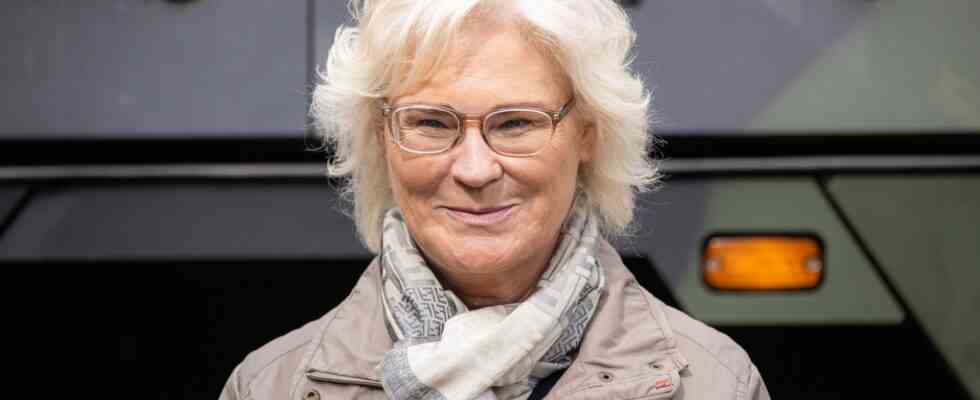analysis
Status: 09/12/2022 4:47 p.m
Defense Minister Lambrecht has consistently demanded higher spending for the Bundeswehr and has claimed a leading role in Europe. On the other hand, she remained tight-lipped about tank deliveries to Ukraine.
When a minister announces a keynote speech, one thing is clear: it should be about the broad lines – about principles that go beyond day-to-day politics. This is how Christine Lambrecht’s appearance at the German Society for Foreign Relations was designed. Appropriately, the headline given by the renowned think tank to the event with the defense minister: “Implications of the ‘turning point’ for Germany’s national security strategy”.
“We will no longer be able to live safely in the future with deliberation alone, with recourse to proven Federal Republican traditions,” Lambrecht explained with unusual pathos. In plain language: In their view, the days when Germany could rely on others for national and alliance defense are over. In any case, with the way Germany sees itself to date, “the future of our children and grandchildren in peace and freedom can no longer be guaranteed,” said Lambrecht.
Keynote speech by Federal Defense Minister Christine Lambrecht, SPD, on the national security strategy
tagesschau24 10:00 a.m., September 12, 2022
Lambrecht calls for a leadership role
For the defense minister, the conclusion is obvious: Germany must assume a leading role in Europe – including in military matters. For this it is necessary for the Federal Republic to invest two percent of economic output in defense in accordance with the NATO target and to relieve the previous security guarantors – the USA – in Europe.
The SPD politician used the development in the east of the continent as a cautionary example. The Russian attack on Ukraine showed “even us Germans who are used to peace” that states need a strong military force to ward off an aggressor: “Ukraine only exists today because it can defend itself militarily.” As a result, Germany needs “armed forces ready for combat” that are able to defend their own territory and that of the alliance if necessary.
So far, so basically. But with the – currently unavoidable – reference to the situation in Ukraine, Lambrecht then took part in the day-to-day political discussion. In any case, it was expected that she would address the one question that is on the mind of so many – not just in the traffic light coalition. Namely, whether Germany is now supplying the country with its own battle tanks in view of Ukraine’s recent successes.
Lambrecht rejects going it alone
The answer is unlikely to silence the criticism of the minister’s line. Because Lambrecht stuck to her position that there would be no German going it alone. So far, no country has sent western armored personnel carriers or battle tanks to Ukraine – and the federal government has already reached its limits when it comes to selling weapon systems from Bundeswehr stocks. In addition, the minister referred once again to the so-called ring exchange with the Czech Republic or Greece, for example, in which NATO partners provide tanks of Soviet design and Germany fills in the gaps that arise. However, so far none of these exchange projects have been completed.
Shortly after Lambrecht’s appearance, the person responsible for the de facto decision on the type and scope of arms deliveries also took a stand: Olaf Scholz also reiterated his previous position: “No German solo efforts”. “Very efficient weapons” were delivered that “make the difference” in the ongoing fighting in eastern Ukraine, said Scholz. He called the anti-aircraft tank “Gepard”, the “Panzerhaubitze 2000”, multiple rocket launchers and the anti-aircraft system Iris-T.
Heavy weapons – but no main battle tanks
In fact, the federal government can refer to extensive deliveries – including those of heavy weapons. For example, Germany has sent a total of 20 of the “Gepard” tanks mentioned by Scholz to Ukraine, with more to follow.
That comes from one list on the internet which the government updates regularly. Ten self-propelled howitzers were delivered, as well as three multiple rocket launchers. The government in Kyiv is still waiting for the Iris-T air defense system. According to the list, Ukraine recently received the Cobra tracking radar. This allows enemy artillery positions to be located.
Lang: “More needs to be delivered”
The fact that Scholz and Lambrecht still do not want to add the tanks desired by Ukraine to this list exacerbates the dispute within the coalition. Green co-boss Ricarda Lang, for example, spoke out in favor of further arms deliveries in the afternoon: “The time of hesitation must be over. More must be delivered.”
And the deputy head of the FDP, Johannes Vogel, also called for the delivery of heavy weapons to be expanded – “also apart from the tough exchange of rings”. This includes, for example, infantry fighting vehicles of the “Marder” type. These are decommissioned tanks that are being repaired by industry and that, according to current plans, are not to be made available to Ukraine but to NATO partners – as part of the ring exchange.
Even after this weekend of military successes for Ukraine, the discussion in Berlin seems to be deadlocked. The FDP and the Greens are demanding more arms deliveries (the Union anyway), but the SPD is putting the brakes on them. However, Scholz leaves a back door open. Even today, he did not categorically rule out a delivery of German battle tanks, but merely emphasized that the Federal Republic would not advance alone.
So if there were signs of a change of opinion in the alliance, the chancellor’s office would have retained a certain amount of decision-making leeway. NATO Secretary General Jens Stoltenberg has already made it clear where he sees the priorities: In his eyes, it is more important to support Ukraine than to have stockpiles of weapons in NATO countries filled according to plan.
Lambrecht wants German leadership in Europe
Mario Kubina, ARD Berlin, September 12, 2022 3:39 p.m

